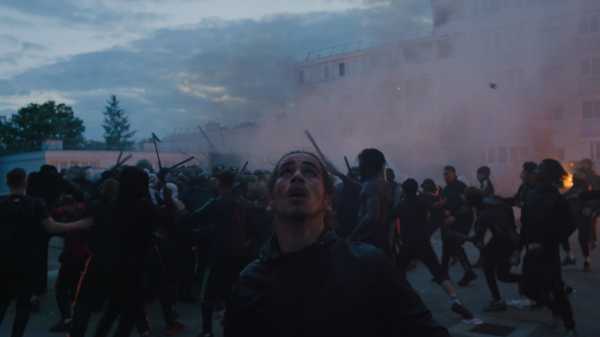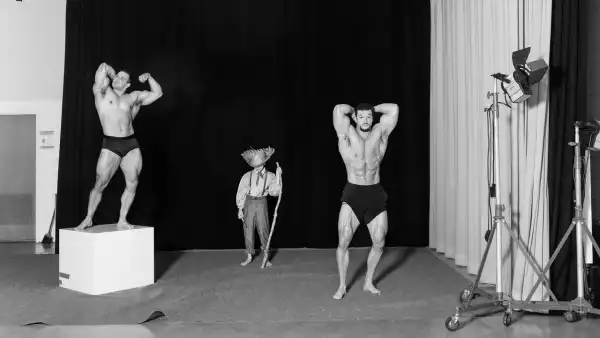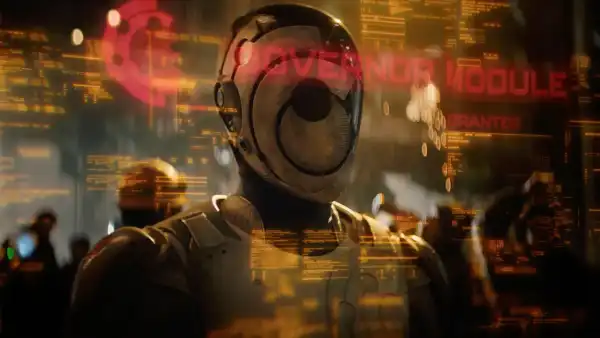
The title of Romain Gavras’s new film, “Athena,” refers to a vast, fictitious housing project in a Paris suburb—the suburbs being where many of the region’s poor and nonwhite residents have long been ghettoized. The movie (which opens today, in New York, at the Paris Theatre and is coming to Netflix Sept. 23) is stretched to the extremes of its own built-in contradictions: it distills its sociological vision of present-day France into a hectic, whirling drama. It’s a story of change couched in terms of the immutable, of thought rendered as spectacle, of politics presented apolitically, of symptoms offered as diagnoses.
Dramatically, “Athena” is centered on a handful of characters whose story is spread thin across a vast fresco of action and a seeming cast of thousands. A video circulates on social media that shows police, at the housing complex, beating to death a thirteen-year-old boy named Idir, whose three older brothers are the movie’s protagonists. Abdel (Dali Benssalah), a decorated veteran of the French Army, shows up at the local police station to address assembled residents and try to keep things calm. His younger brother Karim (Sami Slimane), who appears to be about eighteen or twenty, is the leader of the neighborhood’s young people, and he organizes an uprising to take control of the project and demand justice. The eldest brother, Moktar (Ouassini Embarek), is the local drug lord, who is concerned only for his business. French riot police, the equivalent of the National Guard, launch an assault on Athena, and Karim and his improvised troops wage armed combat against them.
Gavras’s methods are as spectacular as his subject: he relies on the technique—made popular in such films as “Birdman” and “1917”—of extended takes featuring a roving camera amid carefully choreographed, but natural-seeming, action. What’s more, Gavras has drones at his disposal, and they enable the camera to zip through space in ways that dazzle—for an instant—until continued use of the obvious technique yields merely a shrug. The movie’s bravura opening scene starts at the police station and roves from Abdel, addressing the crowd, to Karim, implanted amid it, tossing a Molotov cocktail that engulfs the compound in flames. He and other young people charge through, find a case filled with weapons, and load it onto a police van that they then steal and drive—on the wrong side of a highway—toward Athena. There, Karim organizes the unloading and stashing of the hoard and strides through the project’s broad central esplanade to its ramparts, where other activists are gathered—as the camera then flies out into open space and yields a panoramic view of the complex in revolt.
The shot runs more than ten minutes. Its grandiose intricacy conceals an odd fact that the rest of the film also exemplifies: much of its running time feels like filler—nondramatic events, of characters walking or running from one setup to another, serving solely to conjure mood and ramp up expectations in-between what are, for the most part, only brief and almost epigrammatic snippets of drama. (The movie was written by Gavras, Elias Belkeddar, and Ladj Ly—the last is the director of “Les Misérables,” from 2019, which dramatizes the clash of a project’s residents and the police in far more discerning detail.)
Gavras’s elaborate methods in “Athena”—which involve the grand staging of interconnected events with a huge cast over large spaces—attempt to unite the panoramic and the intimate, the personal and the public, in ways that don’t do any of these elements justice. The three brothers are tethered by connection to their mother (Darina Al Joundi), who’s seen only briefly. (She calls the brothers at unsurprisingly crucial moments in the action, playing a central yet symbolic and sentimental role in the story; the complex of Athena is presented as a man’s world.) Abdel warns Karim that the violence will lead to an even more brutal police response, and he fears that Karim is blindly rushing toward death. Karim is outraged that Moktar remains focussed on drug business despite their brother’s death. Abdel advises the police to calm matters by quickly finding Idir’s killers; Karim, hoping to force the police into handing over the suspects, captures and holds hostage an officer named Jérôme (Anthony Bajon). As the brothers head toward an inevitable, high-energy three-way clash, the rumor circulates that the perpetrators weren’t police at all, but far-right militants in disguise—which Karim takes to be government disinformation. Meanwhile, a plucked-from-the-headlines terrorist suspect (Alexis Manenti) is a supervised and sequestered wild card.
For all its ferocious drama and furious confrontations, “Athena” has as its main subject the sociology of current-day France: the isolation and frustration of nonwhite residents of African and North African descent, their endurance of police violence and police brutality, and the failure of French society at large to address racial and religious discrimination. Yet the movie schematizes the lives of the complex’s residents into the three paths followed by the three protagonists—a collaborator, a criminal, or . . . whatever Karim does. The blanking out of its quasi-revolutionary leader’s character is the very dramatic image of its apolitical politics. Is he in fact politically engaged? Is he working? A student? At what or of what? If none of the above, is he an unemployed person who hangs around with his friends? Where does his sense of purpose and of quasi-military organization come from?
The through line of “Athena” is provided by the intrusion, from offscreen, of the world of the media at large. Radio and television accounts of the murder of Idir are matched by news of other uprisings throughout France; by the end of the movie, the country is said to be in a state of civil war. Meanwhile, the political commentary of the punditocracy blathers on, with an insidiously racist discourse involving law and order, “us” and “them”; the on-air pushback serves only as a liberal straw man for the establishment’s ambient authoritarian fervor. “Athena” is a vision of political apocalypse, and it names the enemy while throwing its cinematic hands in the air, along with the camera. It turns its own story into just another figure in the mediascape that it decries. It offers no discourse, no practice, no options, no alternatives; strangely, in the process, it denies the residents of Athena agency. In the end, even its protagonists are mere extras in a nation-scaled drama. ♦
Sourse: newyorker.com






